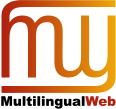Monthly Archives: February 2011
Posts
Announcing a sponsor program for the MultilingualWeb workshops

The W3C has put in place a dedicated sponsorship program for workshops to enable organizations to showcase their business and underscore their commitment to the shared goals of the W3C. The sponsorship benefits detailed below allow workshop sponsors to reach out to all stakeholders and decision makers worldwide and to be associated with breakthrough innovations that are paving the future of the Web.
This program is now available for the MultilingualWeb series of workshops. The MultilingualWeb project is exploring standards and best practices that support the creation, localization and use of multilingual web-based information. Through a series of workshops open to the public and various communication channels, the workshops will spread information about what standards and best practices currently exist, and what gaps need to be filled.
Get information about how to participate in the sponsor program.
Updated article: Choosing a Language Tag
A new section “Decision 6: Extension subtags” was added to refer to the new u extension, registered by the Unicode Consortium to add information about language or locale behavior.
This change produced editorial changes to the second subsection following the new text, now title “Grandfathered tags”.
The section “Further Reading” was also overhauled.
Translators should consider retranslating the affected sections.
Updated article: Language tags in HTML and XML
The section “Extension and private-use subtags” was updated to incorporate the new u extension, registered by the Unicode Consortium to add information about language or locale behavior. Editorial improvements were also added to the description of private use subtags in that section.
Translators should consider retranslating the section “Extension and private-use subtags”.
Unicode Version 6.0 – Complete Text of Core Specification Published
The Unicode 6.0 core specification includes information on scripts newly encoded in Unicode 6.0, as well as many updates and clarifications to other sections of the text. The release of the core specification completes the definitive documentation of the Unicode Standard, Version 6.0.
In Version 6.0, the standard grew by 2,088 characters. Over 1,000 of these characters are symbols used for text exchange on mobile phones. The Unicode Standard now also includes the recently created official symbol for the Indian rupee. After computers and mobile phones update to Version 6.0, the rupee sign will be available for use like the $ or € now.
In addition, this version adds many CJK Unified Ideographs in common use in China, Taiwan, and Japan,as well as characters for African language support, including extensions to the Tifinagh, Ethiopic,and Bamum scripts. Three scripts are supported for the first time: Mandaic, Batak, and Brahmi.
In October of 2010, the other portions of Unicode 6.0 were released: the Unicode Standard Annexes, code charts, and the Unicode Character Database. This allowed vendors to update their implementations of Unicode 6.0 as quickly as possible.
For more information on all of The Unicode Standard, Version 6.0, see http://www.unicode.org/versions/Unicode6.0.0/
MultilingualWeb workshop, Pisa, speaker deadline approaching!
The program for the Pisa workshop is filling up. If you are still intending to submit a talk proposal, please do so as soon as possible in order to secure a place. We advise you not to wait until the March 1st deadline.
We have already accepted many interesting talks, and are looking forward to hearing speakers from organizations such as CNGL, CWI/W3C, DFKI, Facebook, FAO of the UN, Lionbridge, Microsoft, Opera, SAP, TAUS, Thompson Reuters, and many others.
See the Call for Participation for details about how to register for the workshop and propose a talk.
The MultilingualWeb project, funded by the European Commission and coordinated by the W3C, is looking at best practices and standards related to all aspects of creating, localizing and deploying the multilingual Web. The project will raise visibility of what’s available and identify gaps via a series of four events, over two years.
The next workshop takes place in Pisa, Italy on 4-5 April 2011.
Draft for review: Working with Time Zones
Comments are being sought on a new draft of the W3C Note “Working with Time Zones” prior to final release. The new document provides guidelines and best practices for working with time and date values and how time zones affect applications and document formats.
Please send any comments to www-international@w3.org (subscribe) by 28 February.
Editor: Addison Phillips, Lab126.
W3C Multilingual and Accessible Web Camp to be held at WWW2011
The 29th International World Wide Web Conference (WWW2011) will be held in Hyderabad, India between 28 March and 1 April, 2011. It will include a W3C track dedicated to encouraging the development of the Web across languages, scripts and cultures.
The W3C is running an Accessible and Multilingual Web Camp on 30 March. Attendees will be able to discuss issues and topics in breakout groups as well as hearing prepared talks.
If you are interested in participating, please confirm your interest in the related wiki for this developer camp. Please do suggest discussion topics as well!
(A partnership program is also available, providing various benefits.)
W3C® liability, trademark and permissive license rules apply.
Questions or comments? ishida@w3.org